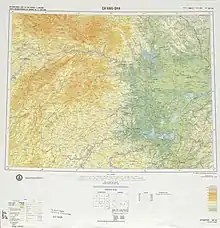Chiang-ling
English

Map including Chiang-ling (Ching-chou) (DMA, 1975)
Etymology
From Mandarin 江陵 (Jiānglíng), Wade–Giles romanization: Chiang¹-ling².
Proper noun
Chiang-ling
- Alternative form of Jiangling
- 1972, Chang, Kwang-chih, “Major Aspects of Ch'u Archaeology”, in Early Chinese Art and its Possible Influence in the Pacific Basin, volume 1, LCCN 79-92798, OCLC 963664402, page 5:
- The archaeology of the Ch'u 楚 has no traditional status or boundary unlike such rigorously defined fields as the archaeology of the Shang, the Minoans, and even the Mayas. Scholars of early China are familiar with a State of Ch'u described in the Shih-chi 史記 (ch. 40) that emerged after a legendary ancestry during the reign of Ch'eng Wang 成王 of the Chou toward the end of the second millennium B. C. somewhere in central China. It grew in size and stature during the late Western Chou period, established a capital and power centre near Chiang-ling 江陵 on the Yangtze in modern Hupei in 689, expanded its rule to a vast area from the upper Huai-ho 淮河 to south of Lake Tung-t'ing 洞庭湖, and was finally subjugated by Ch'in 秦 in 223 B. C.
- 1974, Watson, William, The Chinese Exhibition, Times Newspapers, →ISBN, OCLC 53654792, OL 20026723M, page 93:
- This style flourished especially in the southern Ch'u kingdom, from whose noble tombs at Ch'angsha in Hunan and Chiang-ling in Hupei come some of the finest representative pieces.
- 1999, Red Pine, Mike O'Connor, editors, The Clouds Should Know Me By Now, →ISBN, LCCN 98-17768, OCLC 918324365, page 45:
- In 921 Ch'i-chi was invited by Kao Tsung-hui, military commissioner of the Chiang-ling area in Hupei, to head a temple called the Lung-hsing-ssu in Chiang-ling. In 928 Kao became ruler of an independent kingdom called Nan-p'ing, or Ching-nan, with his capital at Chiang-ling, and Ch'i-chi was apparently able to live the remainder of his life in Chiang-ling, associating with many of the eminent poet-officials of the time and enjoying wide recognition for his literary activities.
- For more quotations using this term, see Citations:Chiang-ling.
-
Translations
Jiangling — see Jiangling